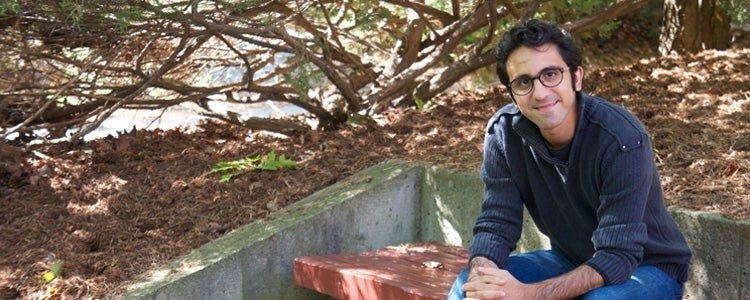Editor:
Brandon Sweet
University Communications
bulletin@uwaterloo.ca
A vibrant institution - even in July
Many universities practically shut down for the summer — not this one.
My work on Waterloo’s behalf has taken me around the world this month, and in fact I send this update to you from beautiful Thailand.
I gave a keynote speech to the 2015 World University of Technology Colloqium on Tuesday, July 28, sharing the Waterloo experience and perspective on promoting technological innovation while maintaining broad-based academic success.
This conference is designed to be a touchpoint for tech universities in Southeast Asia who want to make sure their missions and mandates are in line with the needs of the 21st century.
For Waterloo, it’s an opportunity to learn about regional best practices in higher education and build relationships with key institutions and prospective partners.
We should all be proud — students, faculty, and staff alike — that universities near and far so often turn to the University of Waterloo for inspiration and guidance.
Earlier this month I did my best to provide just that to a meeting at the Sorbonne Universités Strategy Committee meeting in Paris.
I serve alongside several other post-secondary education leaders on this committee, which the Sorbonne has established to inform its strategic directions and thinking.
It’s an honour as well as a thrill to provide input on this historic university system’s strategic direction. And again, it’s the same story: it all traces back to Waterloo’s growing reputation for innovation, research, and academic excellence, thanks to the efforts of you and your colleagues.
It’s been an exciting month closer to home, too.
I was thrilled that several University of Waterloo personnel were named to the Order of Canada. Congratulations to each new member or officer of the Order of Canada and their families! Your well-deserved recognition reflects beautifully on the University of Waterloo, and we are all very proud of you.

Earlier this week Waterloo’s Member of Parliament, Peter Braid, was on campus to announce almost $600,000 in funding to our Columbia Icefield through the Canada 150 Community Infrastructure Program. As Peter said, the arena is an integral part of our community’s sports and recreation landscape. In 2014-2015 alone, more than 11,000 community members used the facility, emphasizing that this isn’t just a university campus, but a campus that our whole community can be part of and proud of.
On that note: I can’t sign off before acknowledging the hugely successful 2015 Canada Day Celebrations. Approximately 65,000 people joined our campus community on July 1 to celebrate our country and kick off the hot summer months.
If you haven't seen it yet, take a minute to watch this video capturing the spirit of the day.
The growing success of our University of Waterloo-FEDS Canada Day celebration shows just how committed we are to supporting the Waterloo region and being an open, engaged campus. Thanks to the hundreds of staff and organizers who made it all happen.
Best wishes for the month to come. And of course, good luck on exams, students!
Sincerely,
Feridun
Tales of a Teacher: Reza Ramezan

by Fahd Munir. This is the third of five Centre for Teaching Excellence Teaching Stories that will appear in the Daily Bulletin over the next two weeks.
Education isn’t just teaching to Dr. Reza Ramezan; it is learning too. As the recipient of the 2012 CUT Award (Certificate in University Teaching) at the University of Waterloo, he embodies the idea that the key to teaching is tailoring your pedagogical practices to meet your students’ needs. It is as much about learning from students, as it is about teaching them.
As a lecturer in the Department of Statistics and Actuarial Science, Ramezan conducts research at the intersection of statistics and neuroscience. If you step into Ramezan’s classroom, you understand how much he values the why behind learning. At the beginning of every term he reminds students that it is both their right and their duty to ask why they should care about the various components of course content, and that they should do this on a regular basis throughout the term. If he is unable to connect the topic in question to the big picture of the course, he won’t touch on it in the exams. Although this policy has kept Ramezan on his toes, so far no topic has been eliminated from midterms or finals.
Ramezan is always looking for new ways to engage students and isn’t above "stealing" effective teaching strategies from the great teachers of his past, books he has read on pedagogy, or from his mentors. One great example is his use of informal midterm feedback. He also plays music before his early morning lectures to help him, and his students, “wake-up.” The addition of group work and peer assessment in his Statistics for Business and Forecasting courses have enabled students to interact and reflect on tasks together. Ramezan also employs what he calls “The Candy Rule” where he leverages a student's sweet tooth by handing out candy to those who ask/answer questions. He elaborates, “If you love teaching, then innovation and interesting ideas will come when you need them, or at the very least, you're going to seek them out in books or from other enthusiastic teachers.”
Student feedback is a strategy that engages students, and Ramezan considers it a pillar of his pedagogy. Obtaining student feedback on different aspects of his teaching helps Ramezan tailor his lectures to maximize learning for his students. He values the informal midterm evaluations just as much as the formal teaching evaluations at the end of the term because it indicates whether a change in teaching style is necessary, and gives him time to adapt for the students that have given the feedback. “Changing my practice for the following term is great if it applies to all students, but each course is different with a different set of learning styles.” Each time he solicits the midterm feedback he summarizes the points and openly discusses the results with his students in order to address problems as soon as possible. His former student, Cynthia McLauchlan, now a teaching assistant and graduate student at the University of Waterloo, observes that "Reza is always enthusiastic about teaching. He constantly checks with his students to see if they're understanding the concepts, and provides frequent opportunities to anonymously give him feedback on his teaching style."
It is also deeply important to Ramezan to make a connection with his students. He makes every effort to be approachable, friendly and enthusiastic about his subject. “Making yourself accessible during office hours, through email and on the course website makes classes feel smaller.” Students in Ramezan’s lectures have also reacted positively to the personal connections that are forged simply by learning their names, even in very large classes where personal contact isn’t always readily achievable. Ramezan reflects on his students’ motivation to learn, saying, “If you care, then they care — it’s just that simple.”
For more information on Reza Ramezan’s teaching philosophy, strategies, and methods please see the Teaching Dossier on his website.
What's open and closed this long weekend
Today is payday for those employees on the monthly payroll, which is a fine way to start a holiday weekend. That's right - Monday, August 3 is a Civic Holiday, observed in most provinces and territories across the country. That means the University, by and large, will be closed on Monday. For example:
All Retail Services locations will be closed for the holiday on Monday.
All Food Services units are closed for the holiday unless otherwise specified on their website.
The Physical Activities Complex and Columbia Icefield will be open on Saturday, August 1 and Sunday, August 2 from 9:00 a.m. to 5:30 p.m., and will be closed on Monday.
As always, the Student Life Centre's Turnkey Desk remains open 24 hours a day, and UW Police are available at extension 22222 or 519-888-4911 off-campus.
An exception is the Library: the Davis Centre will be open 24 hours on Monday, while the Dana Porter Library will be open from 11:00 a.m. to 11:00 p.m. The circulation desk will offer services from noon to 6:00 p.m.
Have a good long weekend, and may your holiday be slathered with sunscreen or barbecue sauce - or both!
Link of the day
85 years ago: The Shadow Knows
When and where
NanoMRI Conference, Monday, July 27 to Friday, July 31, Institute for Quantum Computing.
Pre-examination study days, Wednesday, July 29 to Monday, August 3.
August Civic Holiday, Monday, August 3, most University operations closed.
On-campus examinations begin, Tuesday, August 4.
Minerals Tour, Wednesday, August 5, 1:00 p.m., Earth Sciences Museum.
Online examination period, Friday, August 7 and Saturday, August 8.
Quantum Cryptography School for Young Students, Friday, August 7 to Friday, August 14, Institute for Quantum Computing.
Minerals Tour, Wednesday, August 12, 1:00 p.m., Earth Sciences Museum.
Perseids Meteor Shower Stargazing Party, Wednesday, August 12, 7:30 p.m., OPT 347.
Biomedical Discussion Group Lecture featuring Dr. Herbert Waite; University of California, Santa Barbara (UCSB) “Mussel Power: Defining the Essentials for Translation to Technology” Thursday, August 13, 3:30 p.m. to 4:30 p.m., E6-2024.
Examination period ends, Saturday, August 15.
Quantum Key Distribution Summer School, Monday, August 17 to Friday, August 21, Mike & Ophelia Lazaridis Quantum-Nano Centre Room 0101.
Instructional Skills Workshop - CTE601, Tuesday, August 18, 9:30 a.m., EV1 241.
Minerals Tour, Wednesday, August 19, 1:00 p.m., Earth Sciences Museum.
Retirement celebration for Peter Jordan, Wednesday, August 19, 3:00 p.m., Federation Hall.
Date for students to be "Fees Arranged", Thursday, August 27.
Spring co-operative work term ends, Friday, August 28.
Orientation Week, Saturday, September 6 to Saturday, September 12
Labour Day, Monday, September 7, most University operations closed.
Lean in Higher Education Conference, Thursday, September 10 to Friday, September 11, Federation Hall.
Lectures begin, Monday, September 14.
Hack4Health, Saturday, September 26 to Sunday, September 27, Waterloo Accelerator Centre.
Annual Traditional Pow Wow, Saturday, September 26, 12:00 p.m., Waterloo Aboriginal Education Centre, St. Paul's University College.
AHS Annual Fun Run, Saturday, October 3, 8:30 a.m., BC Matthews Hall.
Fall Teaching Week, Monday, October 5 to Friday, October 8.
PhD oral defences
Chemistry. Solmaz Pirouz, "Quantitative Characterization of Polymeric Engine Oil Additives in Solution by Fluorescence." Supervisor, Jean Duhamel. On deposit in the Science graduate office, PHY 2008. Oral defence Monday, August 10, 1:00 p.m., C2 361.
Sociology & Legal Studies. David Hoffmann, "Warriors and Prophets: The Role of Charismatic Authority in the Radicalization Towards Violence and Strategic Operation of Terrorist Groups." Supervisor, Lorne Dawson. On deposit in the Arts graduate office, PAS 2428. Oral defence Monday, August 10, 2:00 p.m., PAS 2030.
Civil & Environmental Engineering. Yahouan Gao, "Synthrophic Interactions Between Anode-Respiring Bacteria and Non-Anode-Respiring Bacteria in Microbial Electrochemical Cells." Supervisor, Hyung-Sool Lee. On deposit in the Engineering graduate office, PHY 3003. Oral defence Tuesday, August 11, 9:00 a.m., E2 2350.
Mechanical & Mechatronics Engineering. Jin Hee Kang, "Fabrication and Characterization of Nano Carbon-Based Electrochemical Double-Layer Capacitors." Supervisor, John Wen, Sheshakamal Jayaram. On deposit in the Engineering graduate office, PHY 3003. Oral defence Tuesday, August 11, 1:30 p.m., E3 4117.